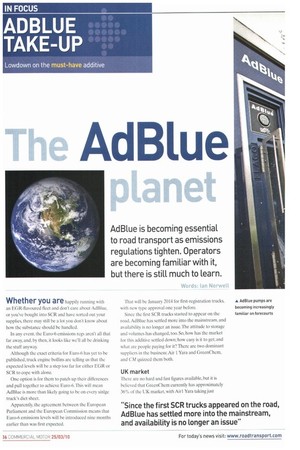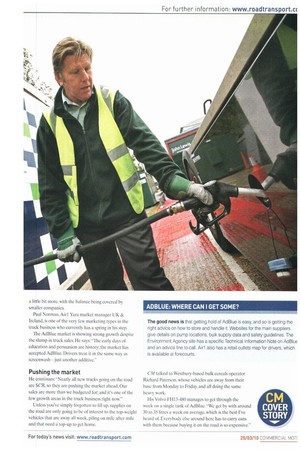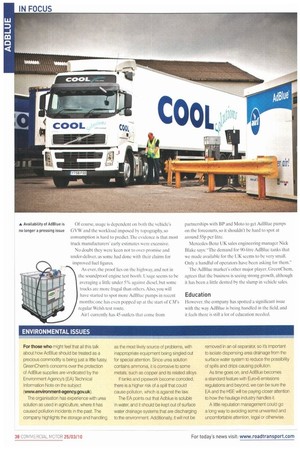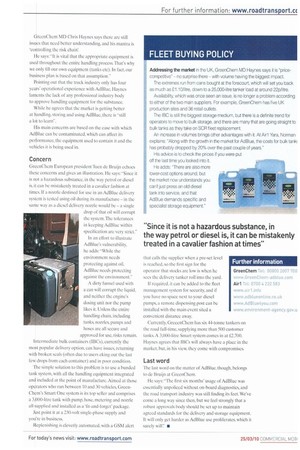AdBlue
Page 36

Page 37

Page 38

Page 39

If you've noticed an error in this article please click here to report it so we can fix it.
AdBlue is becoming essential. to road transport as emissions regulations tighten. Operators are becoming familiar with it, but there is still much to learn.
Words: Ian Norwell Whether you are happily running with an EGR-flavoured fleet and don't care about AdBlue. or you've bought into SCR and have sorted out your supplies, there may still he a lot you don't know about how the substance should be handled.
In any event. the Euro-6 emissions regs aren't all that far away, and, by then, it looks like we'll all be drinking the stuff anyway Although the exact criteria for Euro-6 has yet to he published, truck engine boffins are telling us that the expected levels will be a step too far for either EGR or SCR to cope with alone.
One option is for them to patch up their differences and pull together to achieve Euro-6. This will mean AdBlue is more than likely going to be on every sinlge truck's diet sheet.
Apparently. the agreement between the European Parliament and the European Commission means that Euro-6 emissions levels will be introduced nine month, earlier than was first expected.
That will be January 2014 for first-registration trucks. with new type approval one year before.
Since the first SCR trucks started to appear on the road, AdBlue has settled more into the mainstream, and availability is no longer an issue. The attitude to storage and volumes has changed, too. So, how has the market for this additive settled down; how easy is it to get; and what are people paying for it? There are two dominant suppliers in the business: Air 1 Yara and GreenChem. and CM quizzed them both.
UK market
here are no hard and fast figures available, hut it is believed that GreenChem currently has approximately 36% of the UK market. with Airl Yara taking just a little bit more. with the balance being covered by smaller companies.
Paul Norrnan,Airl Yara market manager UK & Ireland, is one of the very few marketing types in the truck business who currently has a spring in his step.
The AdBlue market is showing strong growth despite the slump in truck sales. He says:"lhe early days of education and persuasion are history; the market has accepted AdBlue. Drivers treat it in the same way as screenwash -just another additive."
Pushing the market He continues: -.Nearly all new trucks going on the road are SCR, so they are pushing the market ahead. Our sales are more than we budgeted for; and it's one of the few growth areas in the truck business right now."
Unless you've simply forgotten to fill up, supplies on the road are only going to be of interest to the top-weight vehicles that are away all week, piling on mile after mile and that need a top-up to get home. CM talked to Westbury-based bulk cereals operator Richard Paterson, whose vehicles are away from their base from Monday to Friday, and all doing the same heavy work.
His Volvo FH13-480 manages to get through the week on a single tank of AdBlue. "We get by with around 30 to 35 litres a week on average, which is the best I've heard of Everybody else around here has to carry cans with them because buying it on the road is so expensive." Of course, usage is dependent on both the vehicle's CiVW and the workload imposed by topography, so consumption is hard to predict The evidence is that most truck manufacturers' early estimates were excessive.
No doubt they were keen not to over-promise and under-deliver, as some had done with their claims for improved fuel figures.
As ever, the proof lies on the highway, and not in the soundproof engine test booth. Usage seems to he averaging a little under 5% against diesel, but some trucks are more frugal than others. Also, you will have started to spot more AdBlue pumps in recent months: one has even popped up at the start of CM's regular Welsh test route.
A ir l currently has 45 outlets that come from
partnerships with BP and Moto to get AdBlue pumps on the forecourts, so it shouldn't be hard to spot at around 55p per litre.
Mercedes-Benz UK sales engineering manager Nick Blake says: "The demand for 90-litre AdBlue tanks that we made available for the UK seems to be very small. Only a handful of operators have been asking for them."
The AdBlue market's other major player, GreenChem, agrees that the business is seeing strong growth, although it has been a little dented by the slump in vehicle sales.
Education
However, the company has spotted a significant issue with the way AdBlue is being handled in the field, and it feels there is still a lot of education needed.
GreenChem MD Chris Haynes says there are still issues that need better understanding. and his mantra is 'controlling the risk chain: Ile says: "It is vital that the appropriate equipment is used throughout the entire handling process. That's why we only ill our own equipment (tanks etc). In fact, our business plan is based on that assumption."
Pointing out that the truck industry only has four years' operational experience with AdBlue. Haynes laments the lack of any professional industry body to approve handling equipment for the substance.
While he agrees that the market is getting better at handling. storing and using AdBlue. there is -still a lot to learn".
His main concerns are based on the ease with which AdBlue can be contaminated, which can affect its performance, the equipment used to contain it and the vehicles it is being used in.
Concern
GreenChem European president Tuen de Hu* echoes these concerns and gives an illustration. He says: -Since it is not a hazardous substance. in the way petrol or diesel is, it can he mistakenly treated in a cavalier fashion at times. If a nozzle destined for use in an AdBlue delivery system is tested using oil during its manufacture in the same way as a diesel delivery nozzle would be a single drop of that oil will corrupt the system. The tolerances in keeping AdBlue within specification are very strict."
In an effort to illustrate AdBlue's vulnerability, he adds: "While the environment needs protecting against oil, AdBlue needs protecting against the environment."
A dirty funnel used with a can will corrupt the liquid, and neither the engine's dosing unit nor the pump likes it. Unless the entire handling chain, including tanks, nozzles, pumps and hoses are all secure and approved for use, risks remain.
Intermediate bulk containers (IBCs), currently the most popular delivery option. can have issues. returning with broken seals (often due to users eking out the last few drops from each container) and in poor condition.
simple solution to this problem is to use a bunded tank system, with all the handling equipment integrated and included at the point of manufacture. Aimed at those operators who run between 10 and 30 vehicles, GreenChem's Smart One system is its top seller and comprises a 3.000-litre tank with pump, hose. metering and nozzle all supplied and installed as a 'fit-and-forget' package.
Just point it at a 230-volt single-phase supply and you're in business.
Replenishing is cleverly automated, with a GSM alert that calls the supplier when a pre-set level is reached, so the first sign for the operator that stocks are low is when he sees the delivery tanker roll into the yard.
If required. it can be added to the fleet management system for security, and if you have no space next to your diesel pumps, a remote dispensing post can he installed with the main event sited a convenient distance away.
Currently. GreecriChem has six 44-tonne tankers on the road full-time, supplying more than 500 customer tanks. A 3,000-litre Smart system comes in at £2.700.
Haynes agrees that IBCs will always have a place in the market, but, in his view, they come with compromises
Last word
'lhe last word on the matter of AdBlue. though, belongs to de Bruijn at GreenChem.
He says: "The first six months' usage of AdBlue was essentially unpoliced without on-board diagnostics, and the road transport industry was still finding its feet. We've come a long way since then, but we feel strongly that a robust approvals body should he set up to maintain agreed standards for the delivery and storage equipment. It will only get harder as AdBlue use proliferates, which it surely will': •




































































































































